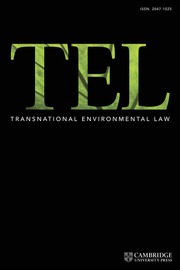Article contents
The Rio+20 Process: Forward Movement for the Environment?
Published online by Cambridge University Press: 03 October 2012
Abstract
This commentary summarizes the events at the recent UN Conference on Sustainable Development, commonly referred to as Rio+20, noting both the role of official national delegations and the diversity of non-state parties that were involved in a variety of venues at and around Rio+20. It sketches the background of sustainable development efforts, maps the road from the original 1992 Rio Earth Summit to the 20th anniversary gathering, and comments on the Conference’s outcomes and their implications for international law and legal institutions. In answer to the much debated question of whether the Rio+20 was a success or a failure, or something in between, the author concludes that the Conference, while disappointing to many, may have furthered the cause of sustainable development by producing a document which reflects a baseline of international norms and by fostering the increasingly important role of civil society action, commitments and partnerships, and of transnational governance.
- Type
- Commentary
- Information
- Copyright
- Copyright © Cambridge University Press 2012
References
1 ‘Greenpeace Press Statement: Rio+20 Summit – A Failure of Epic Proportions’, 22 June 2012, available at: http://www.greenpeace.org/international/en/press/releases/Greenpeace-Press-Statement-Rio20-Earth-Summit-a-failure-of-epic-proportions.
2 ‘Rio+20: The Earth Summit Diaries’, 21 June 2012, available at: http://www.guardian.co.uk/sustainable-business/rio-20-earth-summit-diary-21-june.
3 Ibid.
4 I. Morrison, ‘WWF Rio+20 Closing Statement’, 21 June 2012, available at: http://www.worldwildlife.org/who/media/press/2012/WWFPresitem28214.html.
5 L. Monroe, ‘Final Outcomes for our Oceans in Rio+20 Negotiations’, NRDC Switchboard, 19 June 2012, available at: http://switchboard.nrdc.org/blogs/lmonroe/final_outcomes_for_our_oceans.html.
6 NRDC Press Release, ‘Rio+20: Just a Starting Place for Real Action’, 22 June 2012, available at: http://www.nrdc.org/media/2012/120622.asp.
7 Cloud of Commitments, available at: http://www.cloudofcommitments.org.
8 Approximately 44,000 badges were issued for official meetings, though this number does not accurately reflect the actual number of participants, since an individual might obtain passes for several events. See IISD Reporting Services, ‘Summary of the United Nations Conference on Sustainable Development’ (2012) 27(51) Earth Negotiations BulletinGoogle Scholar, available at: http://www.iisd.ca/vol27/enb2751e.html.
9 Montego Bay (Jamaica), 10 Dec. 1982, in force 16 Nov. 1994, available at: http://www.un.org/depts/los/convention_agreements/convention_overview_convention.htm.
10 IUCN, World Conservation Strategy: Living Resource Conservation for Sustainable Development (IUCN, 1980)Google Scholar, available at: http://data.iucn.org/dbtw-wpd/edocs/WCS-004.pdf.
11 UN World Commission on Environment and Development, ‘Report: Our Common Future’, UN Doc. A/42/427/Annex, published by Oxford University Press, 1987, also available at: http://www.un-documents.net/wced-ocf.htm.
12 For a summary of the world situation in 1992, see Chasek, P. & Wagner, L.M. (eds.), The Roads from Rio: Lessons Learned from Twenty Years of Multilateral Environmental Negotiations (RFF Press/Routledge, 2012).Google Scholar
13 Available at: http://www.un.org/esa/dsd/agenda21.
14 Rio de Janeiro (Brazil), 5 June 1992, in force 29 Dec. 1993, available at: http://www.cbd.int/convention/text.
15 New York, NY (US), 9 May 1992, in force 21 Mar. 1994, available at: http://unfccc.int.
16 Non-Legally Binding Authoritative Statement of Principles for a Global Consensus on the Management, Conservation and Sustainable Development of all Types of Forests (Forest Principles), Rio de Janeiro (Brazil), 13 June 1992, available at: http://www.un.org/documents/ga/conf151/aconf15126-3annex3.htm.
17 Rio Declaration on Environment and Development, Rio de Janeiro (Brazil), 14 June 1992, UN Doc. A/CONF.151/26, available at: http://www.unep.org/Documents.Multilingual/Default.asp?documentid=78&articleid=1163.
18 Available at: http://www.un.org/millenniumgoals.
19 Available at: http://www.un.org/esa/sustdev/documents/WSSD_POI_PD/English/POIToc.htm.
20 Johannesburg (South Africa), 4 Sept. 2002, available at: http://www.un.org/esa/sustdev/documents/WSSD_POI_PD/English/POI_PD.htm.
21 See Closing Remarks by Sha Zukang at the 2nd Intersessional Meeting for Rio+20, New York, NY (US), 16 Dec. 2011, available at: http://www.uncsd2012.org/content/documents/612Closing%20Remarks%20Mr%20Sha%20draft%2016%20Dec%201016%20am%20clean%20REV%20CLEAN%2014_for%20distribution.pdf.
22 See ‘Report: Our Common Future’, n. 11 above, and UN General Assembly, 2005 World Summit Outcome, UN Doc A/RES/60/1, 24 Oct. 2005, available at: http://unpan1.un.org/intradoc/groups/public/documents/un/unpan021752.pdf .
23 Venezuela, in particular, noted the complexities associated with the green economy concept, linking it to consumption patterns, power relationships, security and commodity-dependence. See IISD Reporting Services, ‘Summary of the First Intersessional Meeting for the UN Conference on Sustainable Development: 10–11 January 2011’ (2011) 27(2) Earth Negotiations Bulletin, p. 4Google Scholar, available at: http://www.iisd.ca/download/pdf/enb2702e.pdf.
24 UN Doc. A/66/L.56, available at: http://www.uncsd2012.org/rio20/thefuturewewant.html.
25 Kyoto (Japan), 10 Dec. 1997, in force 16 Feb. 2005, available at: http://unfccc.int/kyoto_protocol/items/2830.php.
26 UN Convention to Combat Desertification in Countries Experiencing Serious Drought and/or Desertification, Particularly in Africa (UNCCD), Paris (France), 17 June 1994, in force 26 Dec. 1996, available at: www.unccd.int.
27 UN Agreement for the Implementation of the Provisions of the [UNCLOS] relating to the Conservation and Management of Straddling Fish Stocks and Highly Migratory Fish Stocks, New York, NY (US), 4 Aug. 1995, in force 11 Dec. 2001, available at: http://www.un.org/Depts/los/convention_agreements/convention_overview_fish_stocks.htm.
28 San Francisco, CA (US), 26 June 1945, in force 24 Oct. 1945, available at: www.un.org/en/documents/charter.
29 See, e.g., M. Prieur, ‘Non-Regression Principle and Environmental Law’, 22 Aug. 2011, available at: http://iucncel.wordpress.com/2011/08/22/non-regression-principle-by-prof-michel-prieur; and the IUCN’s online Non-Regression Principle Knowledge Forum, available at: http://www.iucn.org/about/union/commissions/cel/cel_news/?5888/non-regression-principle-knowledge-forum.
30 European Parliament, Resolution of 29 Sept. 2011 on Developing a Common EU Position Ahead of the United Nations Conference on Sustainable Development (Rio+20), available at: http://www.europarl.europa.eu/sides/getDoc.do?type=TA&reference=P7-TA-2011-0430&language=EN.
31 Statements of the Major Group for NGOs in the Rio+20 process, of 27 Jan. 2012 and 20 June 2012, available at: http://www.uncsd2012.org/content/documents/709ngo.pdf, and http://www.wwf.org.br/?31724/Statement-NGOs-Plenary-session--20th-of-June.
32 Brazil Submission to the Rio+20 Preparatory Process, 1 Nov. 2011, available at: http://www.uncsd2012.org/index.php?page=view&type=510&nr=227&menu=20.
33 Convened by the Fundacao, the Centre for International Environmental Studies of the Graduate Institute, Geneva (Switzerland), Pace Law School’s Brazilian American Institute for Law and the Environment (White Plains, NY, US) and the Center for International Sustainable Development Law (CISDL), Montreal, Canada.
34 Available at: http://www.idlo.int/Publications/ClimateChangeCISLMay2011.pdf. ·
35 Available at: http://www.unep.org/delc/worldcongress/Portals/24151/Rio+Declaration.pdf.
36 For a detailed discussion of the Congress and Declaration see Robinson, N.A., ‘UNCSD (Rio+20): Reflecting on Measured Deliberations’ (2012) 42(4) Environmental Policy and LawGoogle Scholar, pp. 219–31.
- 12
- Cited by


